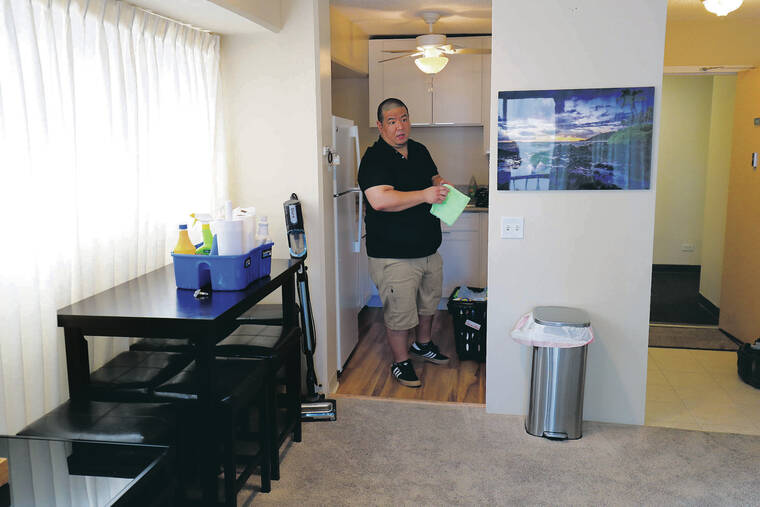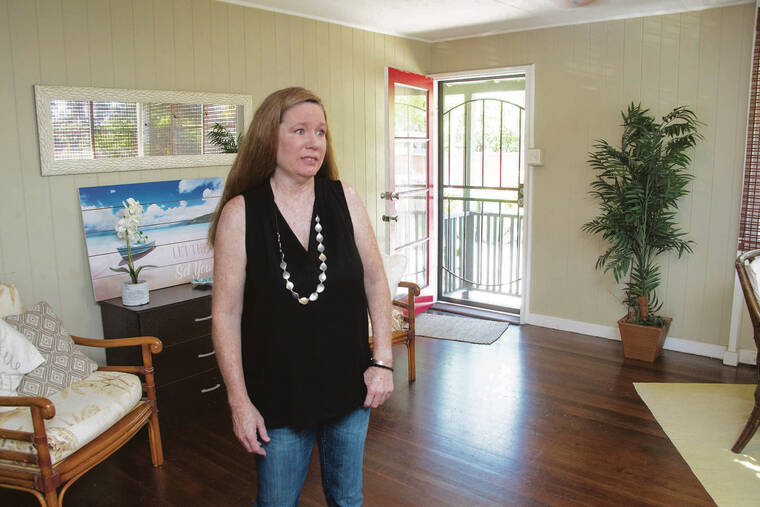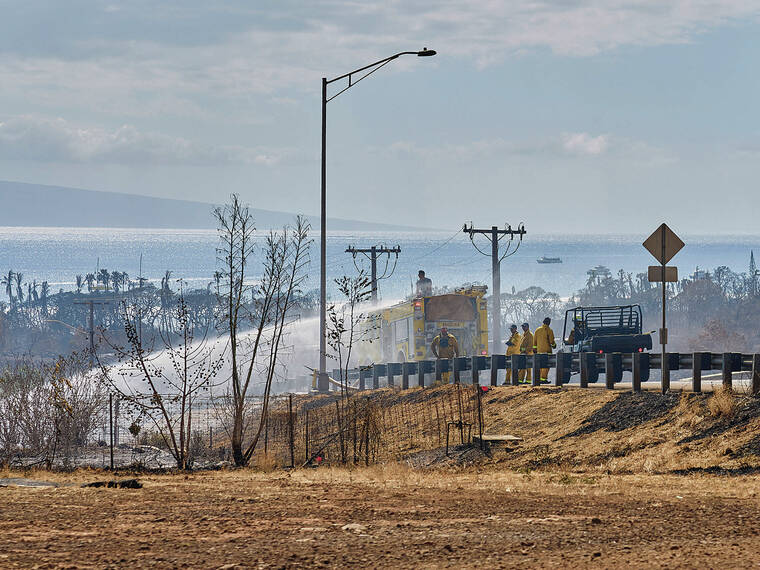Short-term rental law could hurt Oahu’s economy, some say; supporters say it’s worth it

MARCO GARCIA / SPECIAL TO THE STAR-ADVERTISER
Above, Patrick Bollig cleaned up a short-term rental in Waikiki last week. He saw a decrease in business after the passage of Bill 89, Ordinance 19-8, in 2019.

MARCO GARCIA / SPECIAL TO THE STAR-ADVERTISER
Above, Kelly Lee, a Realtor and a leader of the Oahu Short-Term Rental Alliance, says short-term rentals are vital to the community and economy. They create jobs and critical income for families like hers, she says.


Patrick Bollig and his girlfriend, Kira Satterlee, who make their living cleaning short-term rentals on Oahu, have been affected by the turbulence of the industry’s changing regulatory environment.
When Bollig started a cleaning business seven years ago, he was mostly cleaning large whole homes in Kailua. After the passage of Bill 89, ordinance 19-8, in 2019, which imposed stiffer fines and harsher regulations on Oahu’s vacation rentals, Bollig said demand for their services decreased.
The couple recovered their business by switching to cleaning mostly Waikiki condominiums. However, the passage of Ordinance 22-7, Bill 41, which starts enforcement today, limits how much much they can expand as it restricts rentals of 30 days or less to resorts, defined in the law to include specific portions of Waikiki, Ko Olina and Turtle Bay.
Outside of specific resorts, the city has raised the minimum rental time to 90 days from 30, and added additional requirements, restrictions, fees and fines. However, it cannot start enforcement of the 90-day limit due to a preliminary injunction issued earlier this month by U.S. District Judge Derrick Watson in the Hawaii Legal Short-Term Rental Alliance v. City &County of Honolulu lawsuit.
The couple said most of the Waikiki units that they clean are in the legal zones. Still, they are waiting to see how the legislation plays out.
“If we wanted to expand our business with the bill passing, there will be less properties, so opportunities to expand will be harder,” Bollig said. “If it wasn’t for this, I don’t know what I would be doing. It pays well, and I wasn’t fortunate enough to get a higher education.”
Don't miss out on what's happening!
Stay in touch with breaking news, as it happens, conveniently in your email inbox. It's FREE!
The couple are just one example of how the changing regulatory environment for short-term rentals on Oahu has the potential to affect economic realities.
Much of Hawaii’s visitor industry growth since 2015 has occurred because of increases to vacation rentals. Hoteliers have estimated the sweet spot to fill their properties is about 7 million to 8 million visitor arrivals a year, but in 2019 more than 10 million visitors came to Hawaii, with an estimated 3 million of them staying in vacation rentals.
Honolulu Mayor Rick Blangiardi said Thursday during a news conference that when visitor arrivals topped 10 million in 2019, the high-water mark for statewide tourism, “they brought a lot of money.”
Blangiardi estimated that in 2019 visitors spent about $18 billion in the islands and contributed more than $2 billion in sales taxes. Still, he said the downside of short-term rental growth came up when he was campaigning just as often as concerns about homelessness, rail and affordable housing.
“What’s at stake right now could not be any more important to the people of this island,” Blangiardi said. “It’s driven up prices, it’s disrupted neighborhoods, it’s just done a whole lot of things. It’s prevented people from even finding places to live.”
Starting today, Blangiardi said, the city plans to aggressively enforce against illegal vacation rentals, with violators facing fines of up to $10,000 a day.
“We’re going to fine aggressively at unprecedented levels,” he said. “If, in fact, those fines are not paid, we’re going to put liens on properties.”
Economist Paul Brewbaker said short-term rentals were a growing part of Oahu’s only “factory.” If tourism production slumps, Brewbaker said Oahu’s future looks a lot like Detroit in the 1970s after the closure of the auto plants.
He estimates if not for the pandemic, vacation rentals on Oahu could have been worth as much as $500 million in Hawaii’s recent economy. Without those tourism receipts, Brewbaker said, job losses and loss of income for many on Oahu are inevitable, especially when tourism spending adjusted for inflation is still running behind 1989 levels.
He said further decline could lead to more people leaving Oahu.
“If tourism is a fifth of the economy and we want to shrink it in absolute numbers, how is anybody better off? I don’t know how it isn’t obvious that some people will be way worse off,” he said. “People who are going to be better off because of their tribalist impulses — because they want to defend Hawaii or malama the aina — those guys’ gains in welfare are not large enough to compensate the losers.”
When Detroit’s economy shrank, Brewbaker said, people left.
“The lesson we should be thinking about in Honolulu right now is, Are we turning ourselves into the next Detroit?” he said.
Kelly Lee, a short-term rental owner and member of Oahu’s Short-Term Rental Alliance, said the impact of Ordinance 22-7 is different for everyone in Oahu’s short-term rental industry, and not everyone can leave.
“Everybody’s position is different, whether their jobs are as cleaners or landscapers or people who are on the periphery who earn a living via short-term rentals. If there is not as much work, they will all have to find different ways of supporting their families,” she said.
Lee, a Realtor, said she was inspired to become involved with OSTRA due to the struggles of a woman in her 80s who rents out one part of her house and lives in another to make ends meet.
“She can’t go get a job in her 80s to make it. For someone like that, that’s a desperate situation. People might say, ‘Well, you can just sell.’
“If somebody is telling some elderly lady you can just sell, I’d like to ask them, ‘Are you willing to sell because I’m going to tell you to?’”
Lee said the opportunity to short-term rent her property in the past improved her ability as a single mother to take care of her two sons, one of whom is special needs and requires around-the-clock care. Now she’s not sure what the future holds, and is fighting hard to get answers for herself and others who could face economic challenges from Ordinance 22-7.
“Short-term rentals should definitely be regulated. OSTRA believes that, and the real estate industry believes that, but we don’t want an outright ban,” she said.
She said the new law does not account for changing tourism dynamics or the housing needs of those whose stay is too short for a long-term rental and too long for a hotel. Since the pandemic, some visitors also have shown a preference for less crowded spaces, Lee said.
Even so, tourism pushback from local residents has caused more lawmakers to take the position that dropping tourism numbers by curbing illegal vacation rentals is worth the cost. They say illegal vacation rentals contribute to a host of evils, from degradation of natural resources, diluting of culture, and strain on traffic and infrastructure. They also say short-term rentals destroy the fabric of neighborhoods.
The preamble to Ordinance 22-7 states, “The City Council finds that any economic benefits of opening up our residential areas to tourism are far outweighed by the negative impacts to our neighborhoods and local residents.”
Well-organized community groups like Hawaii’s Thousand Friends, Save Oahu’s Neighborhoods, HI Good Neighbor, Keep It Kailua and Save North Shore Neighborhoods have spent decades trying to get lawmakers to rein in vacation rental growth outside of the resort districts.
The groups say they support the enforcement of Ordinance 22-7 and contend that efforts to stop enforcement of the ordinance by the Hawaii Legal Short-Term Rental Alliance “are a threat to all residential- zoned neighborhoods and communities on Oahu.”
They filed a motion last week seeking to intervene in the HILSTRA v. City &County of Honolulu lawsuit to protect their own rights and interests.
Some segments of Hawaii’s visitor industry, including the Hawaii Tourism Authority, the Hawaii Hotel Alliance, the American Hotel and Lodging Association and the Hawaii Lodging &Tourism Association, also supported Ordinance 22-7.
HTA President and CEO John De Fries said HTA’s support for Bill 41 was reflected in its testimony during City Council hearings, as well as its efforts to educate partners and community members “about the adverse impacts of unpermitted vacation rentals, on the quality of life in our communities.”
“The intent of this ordinance aligns with our community-driven Oahu Destination Management Action Plan, which seeks to protect the fabric of our communities while ensuring an increased inventory of housing options for our local residents,” De Fries said.
Kekoa McClellan, American Hotel &Lodging Association spokesman, said the city must defend its right to define short-term rental use, while preserving the 90-day minimum rental period.
“Here’s the reality: This is about housing,” McClellan said. “If you ask any hotel owner or operator what is the biggest challenge facing the community, it’s not wages, hours or quality of the workspace, it’s affordable housing in Honolulu.”
K.C. Connors, a moderator for the Facebook site Enough Tourists Already and former co-chair of the volunteer Windward Homeless Alliance, said she is sure “that there is a connection between the boom in illegal vacation rentals and the housing crisis in places like Ko‘olau Loa.”
“Illegal vacation renters are white-collar criminals, and they’ve been getting away with everything while working people are losing their homes,” Connors said. “When I was teaching in Kahuku, I saw that a lot of students were being uprooted and falling into homelessness. Their long-term rentals were being sold and turned into vacation rentals.”
Moreover, Connors said, the growth of vacation rentals has eroded the culture of Oahu’s rural North Shore communities.
“It’s pushing out Hawaiians and local families,” she said. “People don’t want their children playing outside, because there are strangers on the streets.”
Brewbaker said tourism has been blamed for a host of Oahu problems, but many of them are not unique to tourism.
“We have a problem of congestion to manage, we have a problem of resource degradation to manage, we have issues with cultural authenticity that are of concern, and we should by all means manage them. But what does that have to do with vacation rentals?
“Killing the golden goose, decreasing the size of tourism, absolutely doesn’t actually increase anything else,” he said. “You don’t actually get those other things if you reduce tourism. You just get less, and less is just less.”




